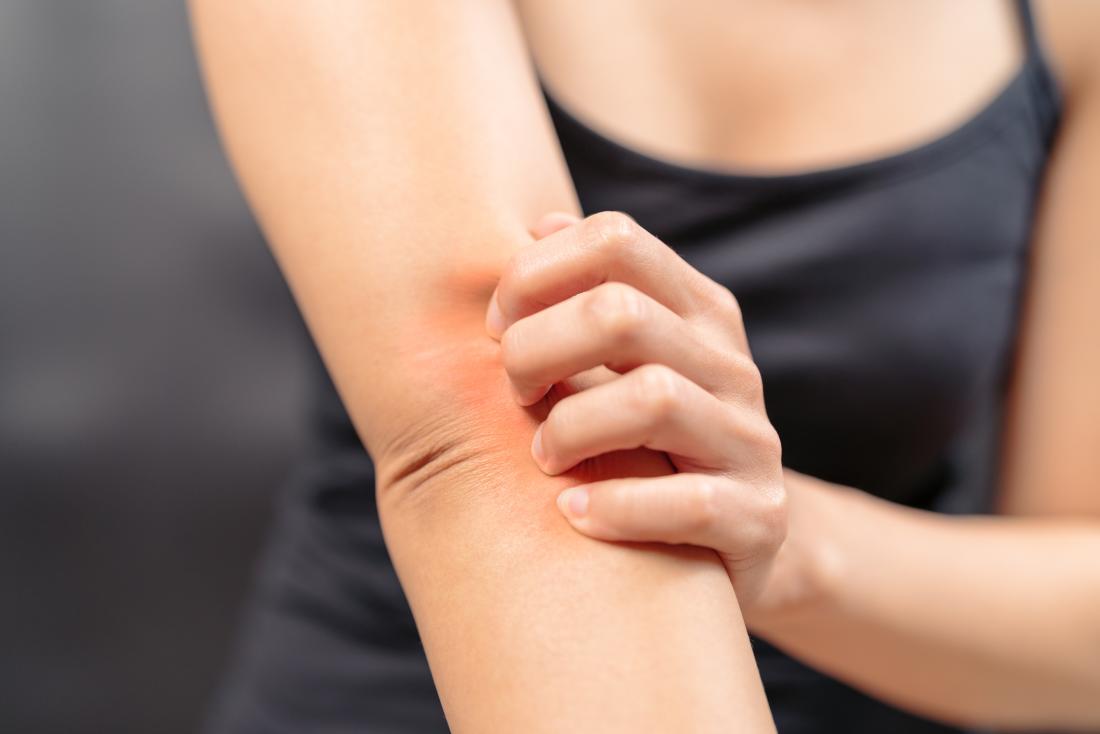
Itchy skin can be annoying – especially when it keeps you awake. Itch-transmitting nerves called C fibers lead to a satisfying release when we scratch, prompting us to dig in with the fingernails even more. Too much of this good thing can lead to worsening itch, excoriations, scars, and even skin infections – not to mention prominent under-eye circles from a poor night’s sleep.
There are many reasons why we might itch. The most common cause is simply dry skin, especially during the winter months – when arid air, hot showers, and other factors cause an exceptionally irritable skin barrier.
But if you’re moisturizing diligently and caring for your skin gently, yet you still feel itchy, it may be time for a doctor’s appointment. A dermatologist can tell what causes your itchy skin, because there are dozens of possible reasons you might be feeling the urge to scratch. Here’s some of them:
Skin conditions
Perhaps you are experiencing a skin disease or condition that predisposes to itching, such as eczema (common types include atopic dermatitis and nummular dermatitis), psoriasis, dandruff (seborrheic dermatitis), seborrheic keratoses, bug bites, or hives. More rare forms of itching include autoimmune and inflammatory conditions, such as lupus, dermatomyositis, lichen planus, bullous pemphigoid, or pemphigus.
Allergy or irritation
You may have developed a skin allergy (allergic contact dermatitis) or skin irritation (irritant contact dermatitis) from a personal care product, fabric, plant (poison oak and ivy are notorious, though numerous other botanical and natural ingredients can cause similar itching), or other substance that makes contact with the skin.
Trigger-happy nerves
You may feel persistently itchy, zingy, or twingy due to nerve dysfunction – like after a neck injury (which can cause itching near the shoulder blades, called nostalgia parasthetica), or a tweak of the nerves in the arms and forearms (brachioradial pruritus), or in an area where the skin is recovering from shingles (post-herpetic neuralgia).

Infection
Some of us itch because of a skin infection – such as a fungus (tinea) or a mite (like scabies) – or a body-wide infection, such as measles or chickenpox (though no one should have to suffer from these particular diseases anymore, on account of safe and effective vaccines).
Medicine
Sometimes, the problem can be due to an oral medicine. Heart and cholesterol drugs, pain medicines, and antibiotics are among many that have the potential to cause scratch-happy tendencies.
Gluten
An intensely itchy rash called dermatitis herpetiformis can develop in some people with Celiac disease – but this skin condition is actually quite rare. True food allergies can certainly cause skin reactions, but gluten and other dietary factors are actually surprisingly uncommon reasons for itching.

Age
As we enter our 50’s and beyond, the skin tends to become drier, the epidermis often doesn’t function as optimally, its pH can change, there may be reduced immune function within the skin, and we are more likely to develop nerve degeneration or dysfunction – all of which may contribute to uncomfortably itchy skin.
Fingernail-induced
Sometimes, itching is our own fault. Conditions called prurigo nodularis (picker’s nodules) and lichen simplex chronicus form when we repeatedly pick or scratch at an area, causing the skin to thicken up and become even itchier – a vicious cycle with the potential to snowball out of control.
Medical conditions
If you have no rash on the skin, but feel itchy everywhere, it may be time for some lab work. Many medical concerns can trigger itching, including problems with the thyroid, kidney, liver, blood count, an undetected infection, or even an emerging malignancy.

























